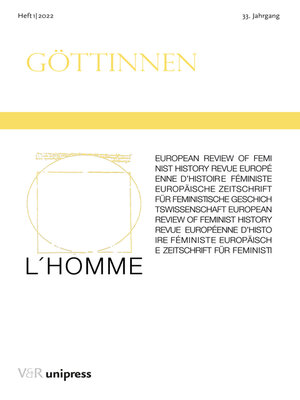
Sign up to save your library
With an OverDrive account, you can save your favorite libraries for at-a-glance information about availability. Find out more about OverDrive accounts.
Find this title in Libby, the library reading app by OverDrive.



Search for a digital library with this title
Title found at these libraries:
| Library Name | Distance |
|---|---|
| Loading... |
"Als Gott den Mann schuf, übte sie nur" – dieser Spruch brachte die Kritik der frühen feministischen christlichen Theologie an einem ausschließlich männlich gedachten Gott und Menschen auf den Punkt. Stehen dann Göttinnen wie Isis, Aphrodite, Freya, Maria, Diana, Natura, die 'Große Göttin', Kālī und Durgā für Weiblichkeit? Inwiefern lässt sich eine 'transzendentale Geschlechtergeschichte' schreiben? Wann ist das Geschlecht von Gottheiten relevant, wie wird es konzipiert und in welche Beziehung wird es zu den Gläubigen gesetzt? Dieses Heft sondiert vom Mittelalter bis zur Gegenwart, welche Diskurs- und Handlungsfelder durch Vorstellungen von Göttinnen eröffnet wurden und inwiefern diese Aufschlüsse über historische Geschlechterordnungen und transzendentale Konzepte geben können. Aus dem Inhalt: Göttinnen im Mittelalter / Göttinnen und ihre Beziehungen zu Frauen / Göttinnenzeiten / Materielle Hermeneutik von Briefen und Fotografien als Erinnerungsobjekte der RAD-Generation (1939–2022) / Im Gespräch mit Caroline Walker Bynum / Medieval Mary / Ein Autobahnschild als künstlerische Provokation in Tirol / Alte Herausforderungen und neue Mittel für feministische Kämpfe "When God created man, she was practicing" – this famous saying succinctly sums up the criticism of early feminist Christian theology. In addition, the Cultural Turn challenged the concept of religion that had been developed on the basis of Christianity assuming a sharp contrast between monotheism and polytheism. Starting from these criticisms and in the framework of a "transcendental gender history" from (late) antiquity to the present, this issue investigates the variety of discourses and actions opened up by notions of goddesses. In so doing, it explores the relationship between gender and transcendental concepts.







